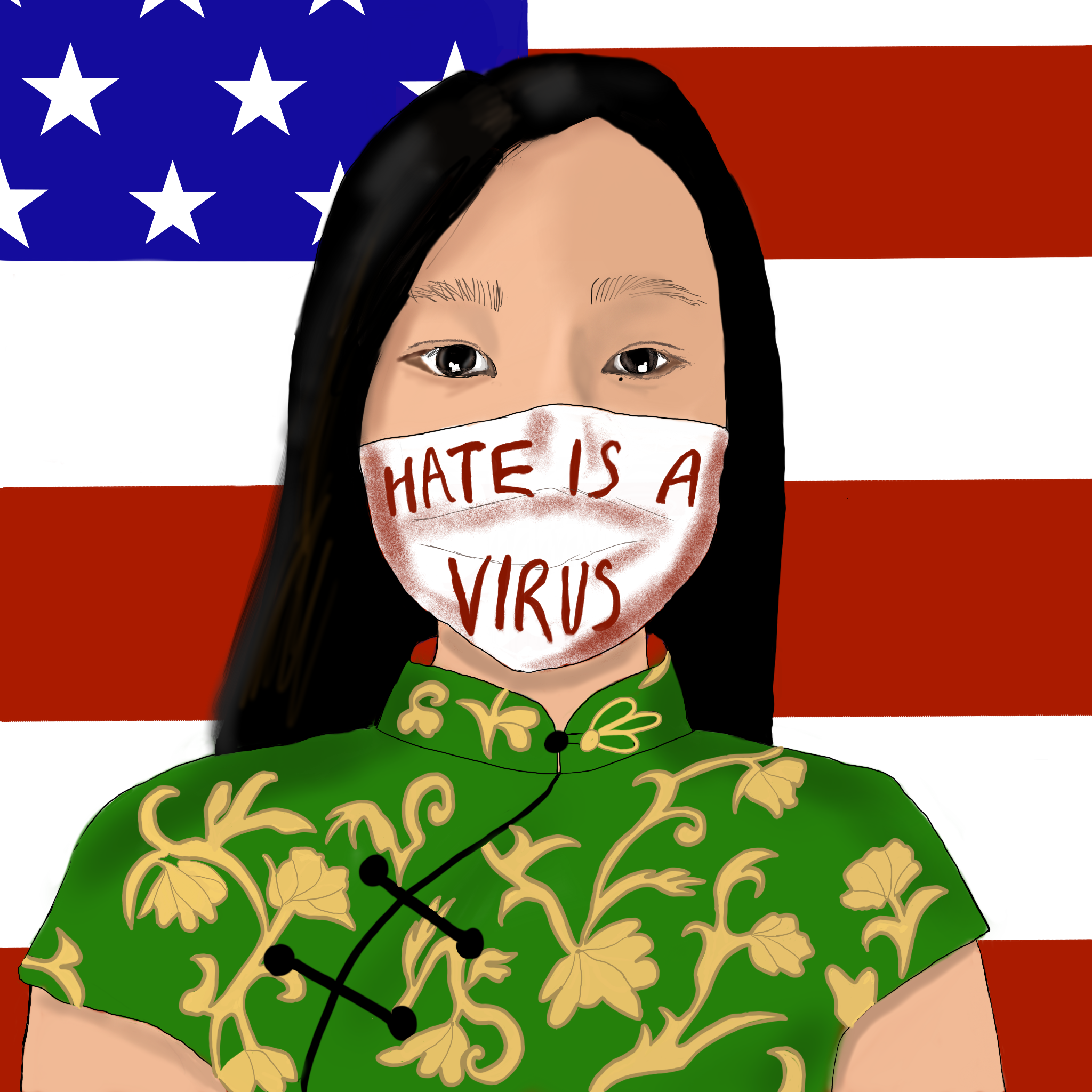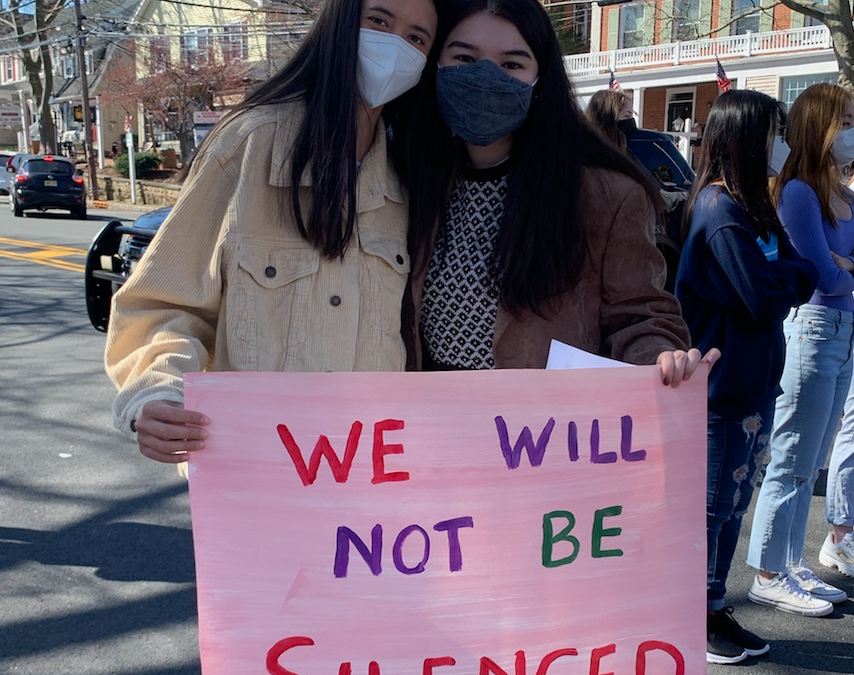
Apr 21, 2021 | Monica Chan, School News, Sidebar News
By Monica Chan (VI)
Over the course of the last three months, there have been a string of violent attacks and murders against members of the Asian-American and Pacific Islander (AAPI) community across the country, bringing about deep pain and grief to their families and the AAPI community at large. These crimes are by no means a new topic as hate crimes against Asian-Americans have been on the rise ever since the beginning of the pandemic; however, the successive violent murders and attacks in recent months have caught national attention due to their shocking severity.
On March 16, eight people were murdered in a mass shooting across multiple Asian-owned massage parlors in Atlanta, Georgia: six of the eight victims were Asian-American. More is being revealed about the victims and their individual stories, and the United States flags were ordered at half-staff until March 22 to honor the victims: Soon Chung Park, Hyun Jung Grant, Suncha Kim, Yong Ae Yue, Delaina Ashley Yaun, Xiaojie Tan, Daoyou Feng, and Paul Andre Michels. While this is by far the most lethal event in the string of anti-Asian crimes that have occurred over the last year, it certainly is not the first. The attacks against Vicha Ratanapakdee, who was killed while walking outside in San Francisco; Ee Lee, who was sexually assaulted and then murdered in Milwaukee; and Noel Quintana, who was slashed across the face with a knife in the New York City subway, are just a few of many.
These attacks and the lack of backlash against them have left many Asian-Americans feeling angered and cheated by a judicial system that does not seem to defend them. Police departments across the country have announced multiple times that many of these attacks will not be investigated as hate crimes. Because of this, AAPI leaders have been organizing multiple rallies and vigils in New York City, Oakland, Atlanta, and other cities. At Pingry, there have been multiple forums for Asian and non-Asian students to discuss and process these events, including a forum planned for Asian parents and caregivers to speak with Diversity, Equity, and Inclusion (DEI) Director Mr. Gilbert Olvera and Head of School Mr. Matt Levinson. The Asian Student Union has been working very closely with Mr. Olvera and Assistant Director of DEI Ms. Alexa Lopez to ensure that the Asian community at Pingry feels heard and included. Jeremy Lin (VI), a co-founder of the Asian Student Union, said, “Whether it is making a heartfelt speech on stage in front of the entire school to holding meetings for our community to come together and discuss these issues, we are trying to spark that same flame and passion in our underclassmen. In Asian cultures, the concept of going against authority and causing trouble is frowned upon; however, our actions as ASU leaders represent the risks we are willing to take. I hope this inspires students to take risks, go outside of their comfort zones to fight for what they truly believe in.” At the second school-wide meeting addressing the recent rise in violent hate crimes, there were over 300 students and faculty in attendance.
It is moving to see how many people we have supporting us, whether they are Asian/Asian-Americans themselves or allies. Lin adds that he hopes “to come back and see the same interest in social justice throughout Pingry’s student community after we have graduated.”
Dec 11, 2020 | Fun, Monica Chan
By Monica Chan (VI)
English 9: Angsty freshmen reading about other angsty freshmen.
English 10: No one actually read Jane Eyre.
Advanced Algebra and Trigonometry Honors: You thought you were good at math, didn’t you…oh well…
AP Statistics: Dear Ms. Peake, can you send me the entire Upper School student email list? I need to do another survey.
Math 6: https://www.wolframalpha.com.
Any Mr. Poprik class: “Ok Folks!”
Any Computer Science Class: The Labs and Problem Sets will bring my grade up, right?
AP US History: More like APUSH me off a cliff please.
US Environmental History Honors: Why didn’t I sign up for APUSH?
American Society and Culture: Boy, am I glad I didn’t sign up for APUSH.
Art Fundamentals: Wait, I thought this was supposed to be an easy graduation requirement!
Chemistry I: Colorado PhET.
AP Chemistry: A 70% curves to an A, right?
Honors Biology II: Were the Bio I Honors Projects not enough of a deterrent for you?
AP Physics C: Mechanics: Everything you learned last year, but add the word “derivative.”
AP Physics C: Electricity and Magnetism: Math 7.
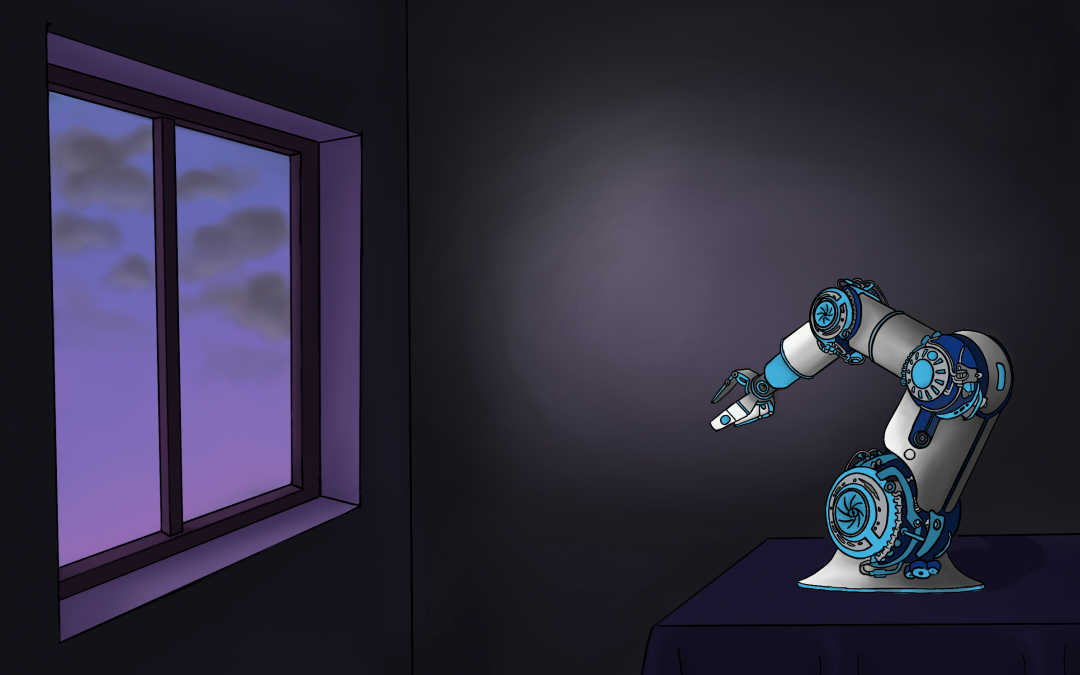
Dec 10, 2020 | Monica Chan, Opinion
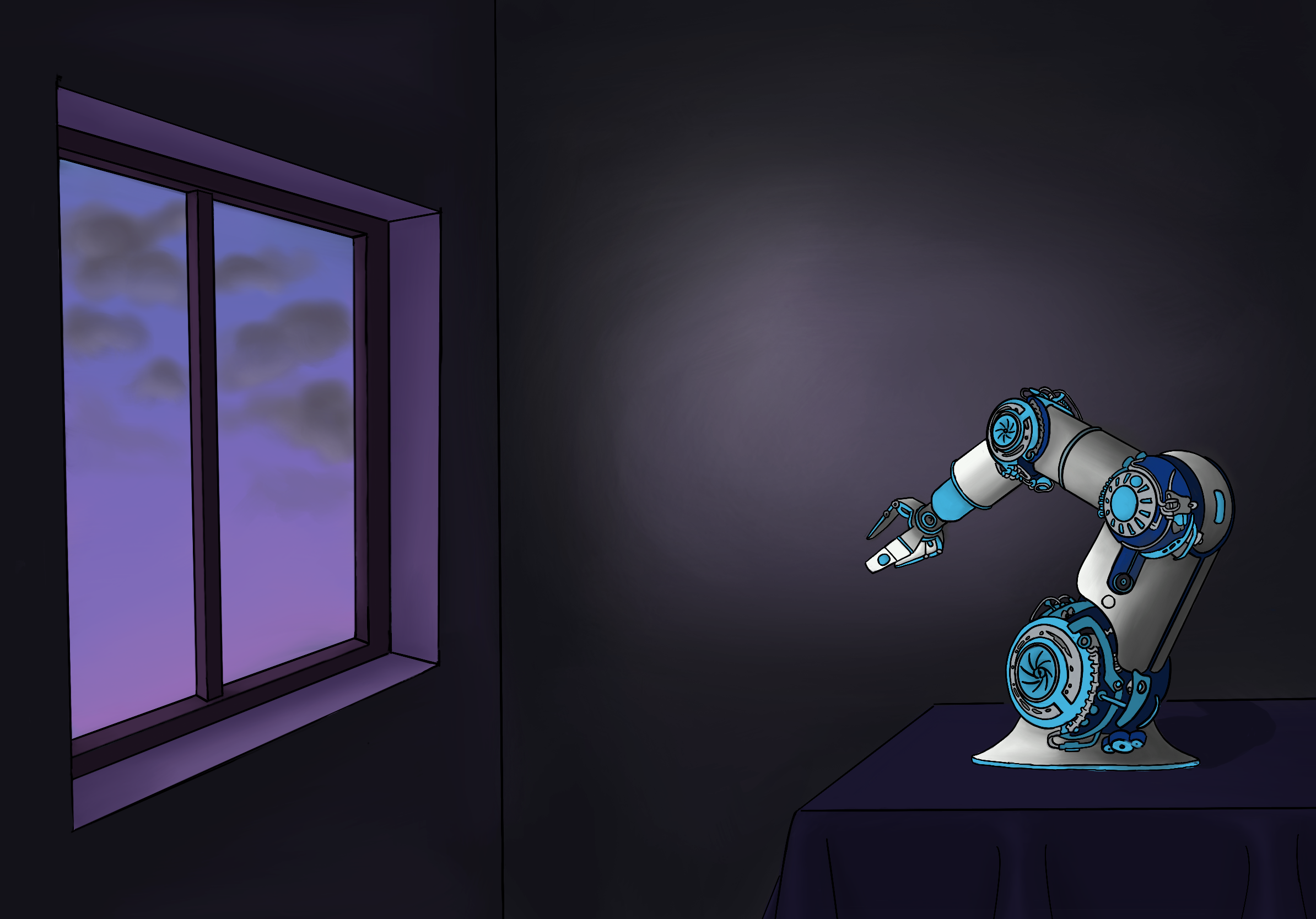
By Monica Chan (VI)
On Friday, the thirteenth of November, I had a free period first block. My mom told me to “drive safely, it’s Friday the thirteenth.” The night before, our robot had run into a few bugs, so I decided to use my free period to go into school and try some fixes. I was really groggy that morning, bitter about sacrificing the extra hour of sleep I could have gotten as I sipped my coffee driving to school. As I turned on the robot, I posted an annoyed selfie on my private Snapchat story, captioning it, “Why am I here?” I then put my phone down and proceeded to test my code. It was all still normal.
When the announcement was made that we were transitioning to fully remote learning, our robotics team worked in a frenzy. In a blur, we packed away the necessities, and I pulled my car around to the arts wing to load it up with everything we thought we might need in the next month. As I drove out of the familiar Pingry driveway, the sun was just setting, the sky a depressing shade of purplish grey. The time was 4:58, the first day that week I’d headed home before 5:30. It was during that drive home that it all settled inside my mind. I thought back to that picture I had posted on my private story, and a sense of regret swelled inside me. I thought to myself, “This morning may have been my last normal hour of robotics.” That’s when I realized the false sense of security that had brewed was suddenly gone. I felt the bottom of my stomach drop to the floor.
As a junior during the initial lockdown, I thought that at least the 2020-21 school year would be normal. I’d still have a chance to savor that last bit of high school life. I’d treasure it. I wouldn’t complain again about the long hours and the late nights. Yet, as school started, we all fell back into the pattern of complaining about our coursework, the face shields in AP Physics, and how Computer Science now took second lunch. We droned on the things we had all missed about being at Pingry. We hadn’t savored it, even though we had all said that we would. We became absorbed in ourselves again. Returning to school gave us a false sense of security about high school and our stay there. All too soon, the awe of our return wore off and we returned to our normal habits and dreaded class. My annoyed expression on my story exemplifies that idea. In retrospect, I regret posting it, and complaining about the extracurricular I had so sorely missed during the full lockdown.
Friday, November 13th, 2020. We all knew something unlucky was going to happen, but it wasn’t the fact that Pingry closed. It wasn’t the fact that our team was going to miss our robotics competition, or that Form VI would miss our in-service day the next Monday. It was the universe telling me I hadn’t kept my promise. It was showing the entire community how delicate our bubble really is, how fast it can all evaporate.
The robot sits near my workspace in the kitchen now, along with boxes of materials that we still have labeled from our trip to the 2019 World Championships in Detroit, a much simpler time in retrospect because we didn’t have to savor it as we had promised to do now. The robot is a physical reminder of the normalcy of school that I try to emulate at home, just like the rest of us are attempting to build our own Pingry bubble at home. Except there’s no laughter from my team, no frustrated sighs when the machines don’t work, no amusing confused expressions of the freshmen when code doesn’t work as expected. And that gap can’t be filled when we are remote. You can’t reform a bubble when it is popped; you can only blow a new one.
Dec 1, 2020 | Columns, Monica Chan, Music
By Rhea Kapur (VI) & Monica Chan (VI) We’ve reached that dreaded first semester of senior year. While our lives seem to be drowning in the realization that we have no idea who we are (but are expected to tell colleges exactly who we are), it is difficult yet even more necessary to find solace in daily comforts. The one constant comfort, besides the shared empathy of our fellow 21’ers and teachers, is music. We bring you a joint music column to share our college application playlists.
Monica:
When looking to get inspired to write my college essays, I like listening to songs with heavy background instrumentals and introspective lyrics. My first song is “When You Come Home” by Rich Brian. This song is written from a parent’s perspective, “So one day, if you find your way, I’ll be waiting for you . . . I got all these questions to ask but I’ll save them for when you come home.” My parents have always been the most present people in my life, and so writing college applications is surreal not only for the reason that I am embarking on the next chapter of my life, but also the realization that my parents will have to watch me from afar.
My next song choice is “Streetcar” by Daniel Caesar. This song was originally written by Kanye West, but I prefer the slower and more melodic version by Caesar. One of the most difficult parts of the application season for me is grappling with a sense of finality. We’ve prepared our entire high school lives for this time, “Let me know, do I still got time to grow? Things ain’t always set in stone, that be known let me know . . . see I know my destination, but I’m just not there.” At this in-between teenager and adult age, we’re beginning to forge our own futures while trying to understand who we are; these events happening simultaneously make it all the more difficult.
“Nights” by Frank Ocean is a slight wildcard. The first time I heard this song I was sitting in the backseat of my friend’s car on the way to someone’s house and we were on Route 287 when someone said, “Wait for that beat drop . . .” There was something magical about it being nighttime and zooming down at (legal) highway speeds surrounded by the laughter and company of my friends that I find relatively comforting reflecting on now. Maybe it’s because we can’t hang out with the same liberty we used to have, and those memories are all the more precious.
Rhea:
When I write, I focus on flow. I study how each sentence glides into the next, I listen to the melody two words sing when side by side, and I observe how each thought fits with every other to form a whole, defined piece. I like to think that how I approach the art of writing – my style – tells just as much of a story as the words do themselves. For me, when it comes to college essays, that’s generally “in media res” storytelling to start, then half stream-of-consciousness reflection, half punchy declaratives. Recently, I’ve designated Spotify’s “Nightstorms” playlist as the soundtrack to my late-night writing sessions. It features recordings of every type of rainstorm imaginable, and in nearly every possible setting; there’s “Thunderstorm in the Cabin,” “Monsoon Storm,” “Lightning Strikes at the Farm,” and even “Oregon Rain.” The storms lift me out of the scramble that is everyday life, offering an escape from the minutia and creating the perfect, focused environment for essay writing. I’m fascinated by how different they sound across the world; Indonesian rainstorms are thundering, intense, incessant downpour, while Swedish ones gently patter along, each large droplet claiming its own, distinctive splash. Every storm tells its own story. And they remind me, too, to write my own stories – to lift my admissions reader into a faraway land where the lighting strikes and little details I craft make all the difference.
Monica mentioned introspection, and I agree; it’s an essential part of the essay writing process. I turn to Lana Del Rey for inspiration in this regard. As an artist, she is intimately comfortable with herself, with natural, human uncertainty. In “Born to Die,” she sings: “Sometimes love is not enough and the road gets tough – I don’t know why.” In “Freak,” it’s “Looking back, my past, it all seems stranger than a stranger.” Seniors, who can’t relate to that one!? Del Rey’s voice brims with feeling; listen to how she sings “Ground control to Major Tom, can you hear me all night long?” in “Terrence Loves You.” Her songs build slowly to a close, a finish that is not always final. I see them as the embodiment of a dream – an imperfect, messy, wonderful subconscious world. It’s exactly where I find myself when brainstorming. At times, I’m in the lows, forehead against the cool countertop, reminding myself that, like Del Rey, it is okay – good, even – not to know, not to be okay. At others, my fingers fly across the keys to keep up with my thoughts, chasing the high of the dream and the height of introspection. Lana Del Ray is every end of the spectrum; seniors, it’s okay for us to be, too.
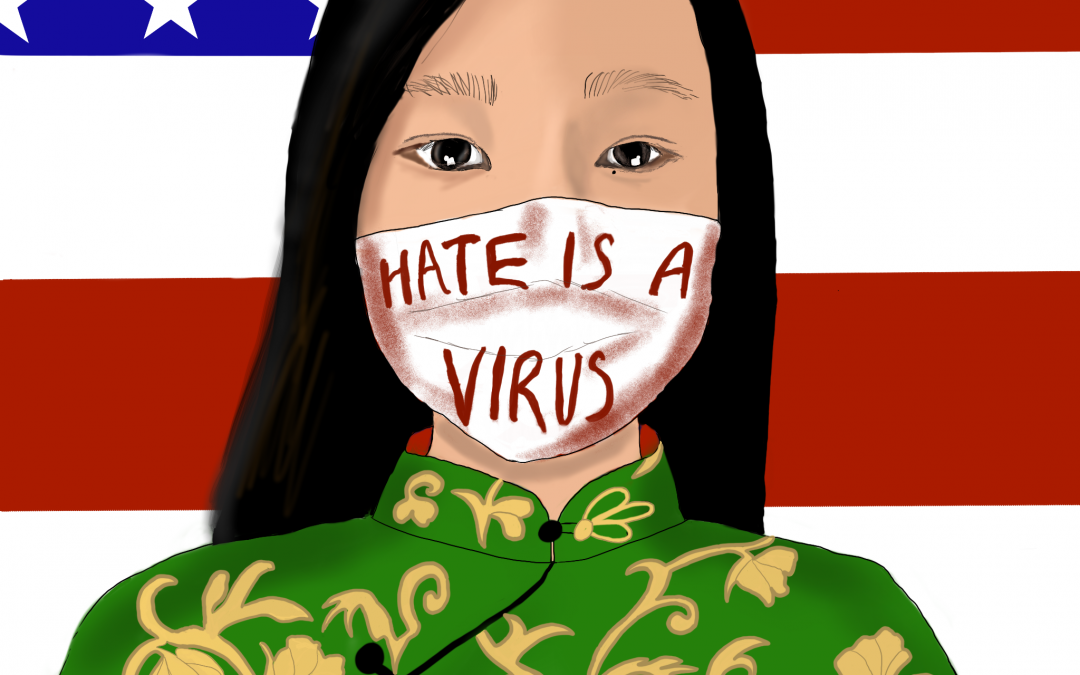
Apr 17, 2020 | COVID-19, Monica Chan, Opinion
“You shouldn’t go outside without pepper spray,” my dad tells me over lunch.
“Nothing is going to happen,” I say.
“Just be careful.”
I sigh, grab the small canister of Halt! that sits on my desk, and exit the house for my quarantine walk. I feel safe, because I know my new neighbors across the street are Asian-American, and so is the other house five doors down. There is a new house being built on the next street over and the new family stood outside their house admiring the construction, and I smile at them. However, the owners of that new house are not as kind, and throw me one of the nastiest looks I think I have ever seen.
I feel the can shift around in my jacket pocket.
I then see a mother walking with her children and a dog, and then one of the other neighbors steps out of her house with her dog, joins the mother and her children, and gives them each a hug. I laugh internally, thinking that they are breaking social distancing rules, but just as they noticed me they moved to the other side of the street. I tried not to notice the occasional glance back from the two adults.
I don’t take that route anymore when I walk by myself. An overreaction? Maybe. I don’t think they’re going to hurt me. I just don’t want to have to go through that again. The shame, the feeling that I need to somehow cover my face. These thoughts have become my new norm.
I have always believed in activism and utilizing our freedom of speech to speak up about topics which are important. While I have been lucky enough to be able to avoid the violent discrimination resulting from the coronavirus toward Asian-Americans, I’ve been pretty vocal about some of the hate crimes that have happened to members of my community, as well as the wider Asian community worldwide. There was the stabbing of a Burmese family in a Sam’s Club; a gun drawn at a Korean university student who had confronted someone for posting coronavirus pamphlets on his dorm room door; man killed as a result of suspected foul play from his neighbor; people beat up in Philadelphia and New York City for not wearing a mask; and the ones who got beat up for wearing one. Unfortunately, these instances only name a few examples.
Comments online about these hate crimes are dominated by people saying things like, “Wow, now you know how all the other minorities feel,” or my personal favorite, “You’re mad now that you got your honorary white person card revoked huh?”
This comment struck me. I think I always subconsciously felt it, but I feel like Asian-Americans aren’t always treated as people of color (POC) in this country. Rather, I view that we are treated as people of color when it is advantageous for a certain view, and viewed as beneficiaries of white privilege at other times. It’s why the system of affirmative action in universities goes against us, but also the same reason we are encouraged to “stand together as minorities” when other groups have their own activist movements. It’s also why politicians use us as a “model minority” for other minorities when those politicians cannot provide adequate support for broken systems.
A large part of this sometimes-POC sometimes-white-privilege dynamic stems from a certain Asian-American community wide unwillingness to “make trouble.” For instance, one of my Asian-American friends encountered a situation where a racist comment was made, and when I encouraged her to speak up, she said her parents didn’t want her to make trouble. This problem with being afraid of conflict is something I’ve heard countless times. It’s why a lot of the hate crimes that are happening now aren’t being reported on by major news media networks like CNN, MSNBC, or FOX. I feel like most of the country mistakes Asian-Americans’ unwillingness to bring about conflict with us not encountering any.
As a leader of the Asian Student Union, this time has brought many questions to me from other members of the community. “What should we do?” and “How do we stay safe?” are all things that younger students, and friends outside Pingry have asked me. I don’t have the answers, and part of me feels like I should as someone who is vocal about Asian-American topics. These aren’t questions I’ve had to ask myself until now. I started the ASU with my friends to enact dialogue and some shift in thought, even if it was just among members of our small Pingry community. I wanted to encourage my peers to recognize and stand up for discrimination, but most importantly to find the courage to stand up for themselves regardless of their identifiers. I never could have expected that the greatest test of my activism would come now. Suddenly, as if overnight, the sphere of these discussions have left the little safe haven that I have helped create in Room 310 at a small private school in Basking Ridge. They feel much more real now, which is scary at the same time as it is empowering. That call to action we’ve been waiting for, that spark that we’ve been hoping will ignite, finally came. It’s time for us to enact the change we wanted to see in our own communities.
I’ve faced a lot of criticism from those around me, those who think I’m being too vocal about the situation at hand, those who think my words aren’t constructive action against the crimes being committed. I’ve even been told that the racism that we are seeing as a result of the coronavirus is justified due to the horrible actions the Chinese government is taking against Africans in China. However, groups pointing fingers at each other is the thing that is least constructive. Racism is racism, no matter which group is committing it, and it should be condemned, not based on the political climate in which it takes place, but for the morals that we as a society have been trying to progress.
Mar 31, 2020 | COVID-19, Monica Chan, School News, Sidebar News
By Monica Chan (V)
Schools across the country are currently navigating uncharted territory in the realm of remote learning, which inevitably brings up the question of how to adjust grading policies. Some schools have decided to adopt pass/fail evaluation, some will omit third quarter grades from the final grade, and others have chosen not to adjust grading at all. Seeing that Pingry is still in the process of considering how grades will ultimately be allocated, I decided to delve into a few possibilities, and illustrate some of the possible benefits and drawbacks of each. Each of these possibilities are for second semester grades only, since we already have one full, undisrupted semester complete. I have also enclosed a summary of the recent Student Government proposal that was sent to the administration by the senior class student representatives.
Pass/fail seems to be a popular choice for many universities, including Harvard and UC Berkeley. The rationale lies in the belief that many students may feel like their current grades do not accurately reflect their potential, and the disruption of remote instruction might hinder their ability to demonstrate growth or reverse the effects of an outlier grade. Some schools have turned to “optional” pass/fail, meaning that students can elect to change certain courses to pass/fail grades. However, Harvard Medical School has stated that they will only accept pass/fail grades if the applicant’s school mandated pass/fail. This type of policy puts students in a tough spot when they have to show a poor grade that could have improved under normal circumstances.
Another idea is to remove the +/- designation. Basically, this option means that there would be no +/- designation on your grade, so if you scored between a 90-100 it would be an A, 80-89 is a B. While I haven’t seen any schools implement this yet, it would provide a ballpark estimate of your grade while still leaving some leeway for performance increase.
During my search for different grading policies, I had a few people outside of Pingry reach out to me with their schools’ grade changes. One student at another school said that their school is grading based on participation, meaning that traditional assessments have been omitted altogether. Instead, a number of research projects or creative projects have been implemented instead. This may be difficult for traditional science and math classes, but perhaps one alternative may be assigning concepts to different groups of students to teach to the rest of the class and then getting graded on the quality of those lessons.
On Wednesday, March 25, Pingry’s Student Government sent a proposal to Dean Chatterji and Dr. Cottingham outlining their suggestions on academic evaluation in the era of remote learning. The proposal included making AP exams optional, which has already been implemented, cancelling final exams, and making spring semester courses pass/fail. For example, if you are in a one semester spring computer science course (Programming Languages and Design, Introduction to Programming) your grade would automatically be pass/fail.
The proposal also suggested that second semester grades for full-year courses (AP courses, core curriculum classes) cannot bring down your final year grade. This means that if you earned an A in the first semester, and currently hold a B+ in your second semester grade for a certain class, the B+ can not bring down your final average. The administration will revisit the grade adjustment discussion in mid-April.
Whatever the administration decides to do with the grading, it is apparent to everyone that this year’s academics won’t be traditional. Many colleges such as Harvard and UChicago have said that they will understand grade changes for next year’s high school senior class, and that will have no impact on their evaluation of you as a candidate. Do not fret!
Dec 9, 2019 | Monica Chan, Opinion
By Monica Chan (V)
When people found out about our plans to start the Asian Student Union, some had asked me why I cared so much or wondered if I only started the group to boost my college application. The truth is, I was upset that the issues I cared about were considered “unimportant.” There was one instance when I reported a student in class who was repeating random offensive syllables and asking me if they meant anything in Mandarin despite me telling them to stop. After my talk with the administration, I never even received an apology from the student.
Another time I felt that issues were cast aside was when the Asian parents at this school felt upset and met with the administration about an inappropriate book that was added to the English curriculum; their concern was mitigated and turned into a social media ploy, an Instagram post showing rows of upset parents on the official school page, captioned happily about how the diversity staff was meeting with the parents of the Chinese-American community. The post was promptly deleted when met with backlash.
Overall, I felt upset with how these issues had been ignored, and no one had tried to reach a true solution.
Unfortunately, ignorance from the administration has been a common theme in Pingry’s history, not with just Asian-American issues, but with issues regarding multiple communities. Instead of working to a solution, I have noticed that Pingry tries to reach “the most politically safe” answer instead. I recently found this trend has been happening for a long time.
About a month ago I stumbled upon a 1990 New York Times article, titled “Private Schools Wrestling With Diversity and Identities,” in which the author talked about diversity-based issues at a number of institutions in our area. A large portion of these issues were about Pingry. The article mentions one instance where the Jewish community at Pingry had wanted to light a menorah next to the yule candle at the annual Winter Festival, and how their request had been met with a “peace candle,” which was supposed to represent the yule candle and the menorah.
Lighting a peace candle didn’t really solve the issue, which was about truly representing the Jewish community at the school during the festival. Instead, this was the most “politically safe” response to the issue. People may ask, why would a politically safe response be bad? It doesn’t hurt anyone and nobody can be offended. While this may be partly true, the most politically safe response doesn’t solve the issue. Instead of figuring out how to make sure that the various groups will feel represented at the school, a politically neutral solution almost seems insulting. It is as if the problem is too insignificant to handle head-on. A neutral solution says, “we aren’t offending anyone, so will everyone get off our case?”
At a school that is as diverse as ours, it is very possible for a student to feel ignored, and their issues can slip through the cracks. Our school is proud that we have the GSA, the Black Student Union, and as of this year, the Asian Student Union. But what about all the identifiers in between? How will a student know where to turn to when they have an issue they want to share with the school that doesn’t fall within these groups? I realize that only a few months ago, this is how I felt at the school. Affinity groups keep the issue within the community, but those topics never get shared outside. Most groups are never covered by the various “diversity workshops” advisories must complete. There is no framework at this school to discuss many important issues that don’t fall within these pre-existing groups.
My co-founders and I started the Asian Student Union because we didn’t want future Asian-American students feeling that there was nothing to support them, as that is how we have previously felt. If Pingry wants to be a genuinely inclusive place, it needs to take its various communities’ issues to heart. For instance, when I reported a very direct act of prejudice, the school should have done its best to appropriately handle the situation instead of letting it go with no consequences. Pingry needs to fully address issues like these––otherwise, the school would not be supporting its students. Additionally, I implore this institution to genuinely solve problems, rather than finding a political “peace candle” solution that, in the end, makes nobody happy. Speak to students who have been affected one-on-one, reach out to the parents to gauge their opinions more often, and act on their feedback. Most importantly, though, encourage dialogue regarding all groups––not just a select few. And to you, reader, who potentially has something to say buried within the depths of your silence, my advice is to say it loud and clear. If there’s no framework here, build it. If it’s never been done here before, do it. Make it known that you will not be ignored and that you are the change we need at this school to truly make this community one that you are a part of.
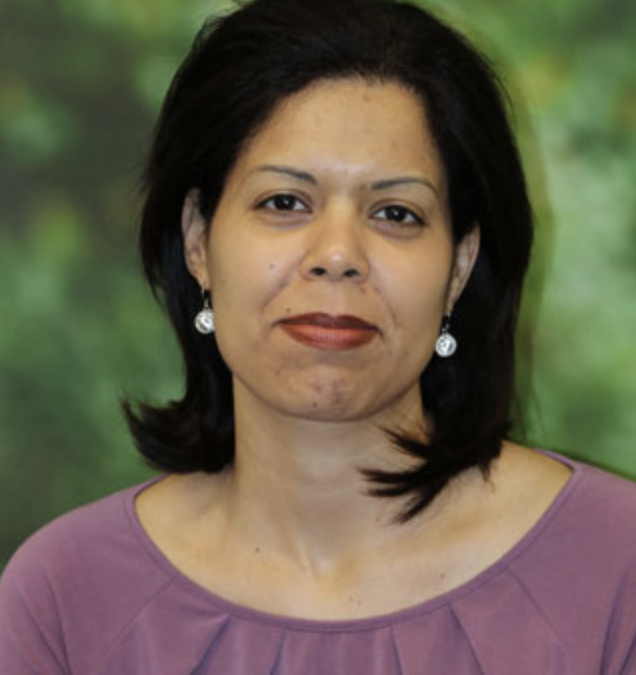
Oct 18, 2019 | Faculty + Staff, Monica Chan
Monica Chan (V)
With a passion for teaching and love for the Spanish language and culture, Ms.Guadalupe Nunez receives a warm Pingry community welcome. This fall, Señora Nunez joined Pingry as a Middle School Spanish teacher and Form I advisor. In addition, she will be helping with the production of the Middle School play.
Ms. Nunez graduated from Syracuse University, where she earned a Bachelor’s Degree in International Relations and Human Resource Management. She received her Master’s Degree in Foreign Language Education from New York University. Before joining Pingry, Ms. Nunez taught Spanish to elementary and middle school students at schools such as Hunter College Elementary School, Trevor Day School, and New Canaan Country School.
Besides her teaching posts, she also implemented a program for non-English speaking students at Teach for America and worked with other non-profits around the New York City area including the International Rescue Committee, the Coalition for the Homeless, and El Museo del Barrio. In addition to these roles, Ms. Nunez has also worked with a middle school on their diversity committee.
Throughout this school year, Ms. Nunez sincerely hopes to “infuse a love for learning languages and for appreciating the people and culture of the Spanish-speaking world,” which ties in to her passion for teaching. Ms. Nunez says that she was “inspired to become a teacher because through teaching, I feel you can empower students to follow their dreams and be advocates for themselves.”
Outside of Pingry, Ms. Nunez enjoys cooking and taking part in different recreational activities with her two sons. When asked what she enjoys about Pingry, she says that she particularly admires the inquisitive nature students and honorable character of the students.





